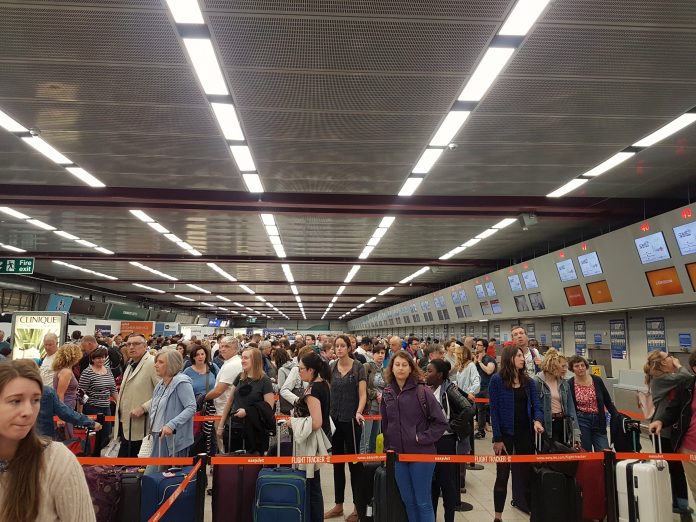Airport worker
The problems of the airline industry predate the pandemic, and stretch back to privatisation in the 1980s. In the post-war period, governments invested billions in the creation of a worldwide airline industry.
This investment was vertical. Governments supported airplane manufacture, and invested in airports, air traffic control, aircraft maintenance, and training facilities for pilots, engineers and cabin crew. Money was also put into aircraft fuelling, catering and numerous other support functions.
In the 1980s, catering and cleaning staff would still be airline employees, as well as tens of thousands of frontline and back-office occupations. With privatisation under Margaret Thatcher, the Tory government sold state assets at a discount, resulting in the jobs being outsourced.
International companies began to amalgamate functions. Airports became owned by huge conglomerates, who wished to make them as profitable as possible.
Few airlines would have workers at other airports beyond their home base, so they have to buy in all these others functions, like catering, from third-party companies all around the world. At the same time, British Airways’ main engineering base was relocated from Heathrow to south Wales.
All this activity has been designed to divide the workforce, creating different terms and conditions. There have been few opportunities, within this constant deregulation, to improve pay and other benefits.
But the last 30 years has seen a constant struggle by workers within the industry attempting to defend the gains of the past.
Prior to the pandemic, a succession of these outsourced companies would fall into administration as the outsourced owners would sign contracts on the basis of them forcing down the wages and conditions of their employees. British Airways ended up owning one of these collapsed companies at Gatwick Airport, because it could get no one else to sign a contract that would require workers’ rights to be forced down to illegal levels.
Job cuts
IAG airline multinational promised to reduce costs by amalgamating back-office functions, and then outsourcing them to different countries, cutting thousands of jobs. When the pandemic hit, airlines saw the opportunity to further drive down workers’ living standards.
British Airways in spring 2020 called on the government to give no financial assistance to the airline industry. The big airlines hoped to be the ‘last companies standing’ once the pandemic was over.
British Airways introduced ‘fire and rehire’, driving down wages by 10%, and shedding half its workforce.
BA’s most experienced workers – therefore with better pay and conditions – were made redundant. They are now trying to recruit new staff on new contracts with significantly lower wages.
A job in the airline industry is no longer the well-paid and secure employment of the past. Now almost any other job is better paid.
Even the pilots’ union leadership has agreed continuing pay cuts until 2025. However, this is likely to be rejected by its members.
The latest airport chaos which passengers have experienced is a consequence of the greed of the industry. Due to the relentless cost cutting, the chaos could continue for some time.
Workers in the industry will wish to regain their pay levels as the cost of living bites. Therefore, they could well take strike action throughout the summer.
The madness of capitalism reduces a complex process of moving millions of people into a myriad of profit centres, resulting in threadbare infrastructure. Transport needs to be renationalised, so a coherent national plan can meet the needs of passengers and climate change.
British Airways workers begin voting on strike action
Nadine Houghton, GMB union national officer, said: “British Airways’ staff shortages and IT failures nearly brought Heathrow airport to a standstill. On top of that, BA workers had their pay slashed during the company’s callous fire-and-rehire policy.
“Now they want that money back. Bosses have had their pre-Covid pay rates reinstated. Heathrow ground and check-in staff want to know why they haven’t had it too.
“Unrest is now starting to spread like wildfire to other groups of BA workers, with many more now considering a vote to walk out.”
Hundreds of BA workers at Heathrow airport are balloting for strike action from 7 to 23 June.








